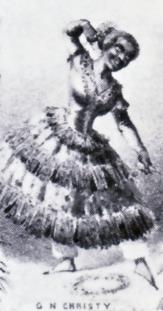After only 6 years on the road with different minstrel
companies, he formed his own troupe with comedian Edwin Kelly. By 1882,
Leon was the highest-paid prima donna in minstrelsy. Leon was imitated throughout the world of
minstrelsy and he eventually copyrighted his performance name as
"The Only Leon." In later years, the Leon and Kelly's Minstrels disbanded, and Leon starred with the San Francisco Minstrels.
After he left show
business the real Patrick Francis Glassey just faded away into obscurity.
Leon would have wanted it that way.
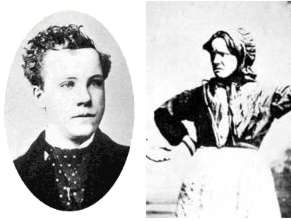
Tony
Hart
(Anthony J. Cannon)
1855 -- 1891
Tony Hart was described as, "best genteel wench that ever trod the boards."
Tony Hart was the stage name of Anthony J. Cannon, who was born in Massachusetts and attracted to theater
at an early age. His parents were less enthused about his theatrical leanings. In fact they sent him to reform school in an effort to keep him from the stage. But at the age of thirteen, he escaped from the Westborough reformatory and hit the road, doing stints as a bootblack, newsboy, and singer (not to mention joining a circus or two).
He
began his career in minstrel shows as "Master Antonio, the Boy
Soprano." He met Edward Harrigan in 1871, in Chicago, when he was
16. Harrigan teamed up with Hart for a highly successful thirteen years.
From the onset, Hart played the female roles, beginning with "The
Little Fraud" in which Hart was a "fresh-faced Dutch girl with
a mellow voice."
The detective William Pinkerton, an expert at seeing through disguises, once refused to believe that Hart was a man even after being taken backstage following a performance and allowed to scrutinize his costume and make-up at close range. Pinkerton was not persuaded of the truth until Hart had pulled off his wig and let loose with a few robust phrases that could only have been learned in a boys' reform
school.
Harrigan and Hart were so popular that they built
their own minstrel house in 1881 only to have it burn down three years
later. They ended their partnership shortly thereafter and Tony Hart
teamed up with his wife Gertie, often with both playing female roles.
Tony's professional downfall came as a result of late-stage syphilis.
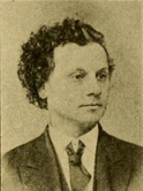
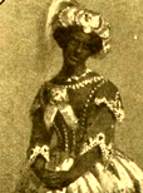
Eugene
(Eugene D'Ameli)
1836 -- 1907
Eugene was acclaimed for his
"delineations of female characters that were so finished, so true
to life. that the Germans in Berlin during an engagement there in April, 1862, were emphatic in their declarations that he was a woman." He began with Wood's Minstrels where he was joined by
George Christy in 1853 and ended his career thirty years later with the
Leon and Cushman Company in 1883. During his career, "Eugene" traveled
with many different minstrel troupes throughout the US, Europe and Asia.
In May, 1884, he made his last appearance on any stage. "Eugene" was born in New York City, June 4, 1836; he died in
Brooklyn, N. Y., January 18, 1907.
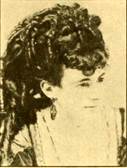
Ricardo
(Foley McKeever)
1844 -- 1883
Ricardo worked with several well-known
minstrel groups, including Kelly and Leon. "Ricardo" was well and favorably
known as a clever female impersonator, was with Mrs. Matt Peel's Minstrels about 1863.
Subsequently he appeared with the Associated Artists of Kelly and Leon in
1869. Early in 1870 he joined Billy Emerson's Minstrels, and in 1871 made
his debut with Manning's Minstrels in Chicago. He was a member of
Haverly's Minstrels in 1873. "Ricardo" was born in Ireland, about 1844; he died in
New York City, October 30, 1883.
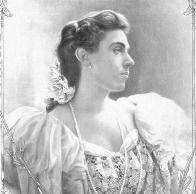
Stuart
(Everett Stewart)
"Stuart" (Everett Stewart), who achieved international fame as the
"Male Patti," began his professional career as a singer with McIntyre and
Heath's Minstrels in Springfield, MO, in the Fall of 1887. And this is how it
happened " "Tom" Heath sauntered into the Post office at Wichita,
Kansas one morning, and inquired if there was any mail for McIntyre and Heath's
Minstrels. Yes, indeed, there are lots of letters for the minstrel boys, said a real gentlemanly voice
behind the window. Heath hired him on the spot and a few days later, Stuart "blacked up" for the first time in his life.
Later, "Stuart" took his operatic voice and lavish gowns throughout the music halls of Europe from 1899 to 1908.
It was certainly a coincidence that the boy who had previously answered inquiries
daily concerning missing letters, should have as his signature song, "The Letter That Never Came."
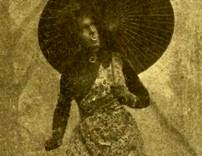
Fred Dart
1856 -- 1890
Fred Dart was considered one of the best and most versatile "wenches"
in minstrelsy ; he was for many years with Sam Hague's Minstrels in
Liverpool, and when Mr. Hague came to this country in 1881, Mr. Dart was with
him, subsequently joining Carncross' Minstrels in Philadelphia, where he
remained until the time of his death. Fred Dart was born in Liverpool, England.
He died in Philadelphia, March 30, 1890; age 34 years.
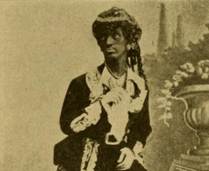
Rollin Howard
(Ebenezer G. B. Holder)
1840 -- 1879
Rollin Howard (Ebenezer G. B. Holder) was one of the most cultured
and capable female impersonators of minstrelsy. He appeared on the legitimate stage for about five years previous to his minstrel debut, which was made with Wood's Minstrels in the Spring of
1860. In the fall of that year, for a brief period, he was associated in the
management of Howard and Campbell's Minstrels.
In 1861, he made his first appearance with Hooley and Campbell's Minstrels in New York, and for several seasons played successful
engagements with nearly every prominent minstrel company there was. About 1870 he left minstrelsy, and after a period in opera, played
several years in variety houses. In 1868 he played Topsy in "Uncle Tom's
Cabin," and in 1878 was manager of the Melodeon in Philadelphia. Rollin Howard was born in New York City about 1840; he died in
Boston, MA, June 19, 1879.
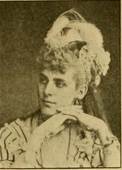
Burton Stanley
In May 1875, the Chicago Tribune described Stanley as
"a male soprano" and "the greatest of all the female
impersonators." Little is known of Stanley's life.
In 1875 he
was with Haverly's Minstrels; September 2, 1879, he joined a dramatic organization in "Larks," and a few months later was traveling with
Stanley's Juvenile Company. August 24, 1881, he opened with Brooks, Dickson
and Clapham's Minstrels; the tour was a brief one and in November
following, Mr. Stanley joined Leavitt's Minstrels. His next important
engagement was with Emerson's Minstrels in San Francisco; here he met Gus
Pixley, later forming an alliance, playing the variety houses for several
seasons. His last show in Chicago was at the Olympic Theatre in November
1879.
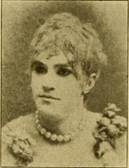
Harry Lansing
(Harry Zebley)
-- 1887
Harry Lansing an old-time female impersonator, was with
Simmons and Slocum's Minstrels in Philadelphia in 1874. In 1879 he was with Haverly's Minstrels. About the middle 80's he had as a partner, Harry Constantine; together they played the variety theatres. Harry Lansing
was murdered in Philadelphia, in February, 1887.
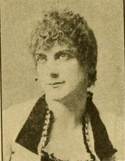
Arthur Doty
(Arthur Oakman)
-- 1890
J. Arthur Doty (Oakman) was a clever female impersonator, and a bright writer of sketches, burlesques, etc. In 1879 he worked with Fred Malcolm doing acts in the variety houses. September 11, 1886, he began an engagement with Simmons and
Slocum's Minstrels in Philadelphia; subsequently, and for about eighteen months, he did an act with Belle Fairmont.
J. Arthur Doty died in Detroit, Mich., April 13, 1890
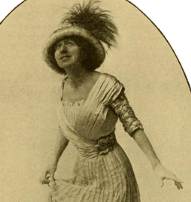
Charles Hilliard
(Charles Hurst)
1885 -
From chorus man to burlesque prima donna in two years is
certainly going some; nevertheless that is the proud distinction
accorded to Charles Hilliard, who made his first professional appearance
with Frank Lalor in "Prince Humbug" in 1908, in the minor
capacity already referred to. The following year Mr. Hilliard was
engaged with Cohan and Harris' Minstrels, also as a chorus singer;
before the season was over he was playing a prominent part in the
after-piece. August 10, 1910, Mr Hilliard played for the first time, the
principal female role in the "Fireman's Picnic" with George
Evans' Minstrels' his success was emphatic. Charles Hurst was born in
Sumter, SC, June 23, 1885.
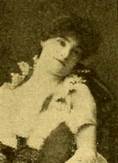
James Mack
(James McAvoy)
- 1890
James Mack (McAvoy), who attained some prominence with
minstrel shows as a female impersonator, died at Elyria, Ohio, November
5, 1890; age 32 years.
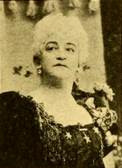
Gus Mills
- 1903
Gus Mills achieved considerable popularity as a female
impersonator with Simmons, Slocums's and Sweatnam's Minstrels in
Philadelphia; Dockstader's in New York, as well as Emerson's and other
well known organizations. He died in Chicago, Ill., October 6, 1903; age
about 55 years.
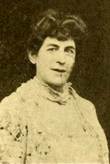
Charles Heywood
(Frank Haffner)
1848 -
Charles Heywood (Frank Haffner), who has an
international reputation in minstrelsy as a female impersonator, posses
a remarkably fine cultivated voice, which long experience has taught him
to use to the best advantage. Mr. Heywood made his debut with an amateur
minstrel company in Newark, N.J., in 1867, at the famous old Library
Hall. In Jaunary 1868, he appeared professionally in New York with Kelly
and Leon's Minstrels. My Heywood joined Haverly's Mastodons in London,
in 1884. After several notable engagement in the music halls on the
Continent, he returned to this country and subsequently built a theatre
in Newark, N.J.
Other female impersonators of the same era were
W. H. Rice, J. T. Huntley, George W. Charles, Lewis J.
Donnelly, George Wilkes, Harry Constantine,
Billy Lyons, Fred
Malcolm, Justin Robinson, Ernest Linden, Lincoln
Ellwood, Burt Shepard, Paul Vernon, "Bernardo" (Thomas White), Charles Fostelle (Stephens),
"Eustache" (George Worrell Culbertson), Fred Frear, Fred B. Malcolm, "Handsome Harry"
(Harry (Jas. H.) Armstrong), Billie Barlow (Wm. S. Wyatt), Buck
(Charles) Sheffer, Billy Benson (James Corrigan), Julian Eltinge (Dalton),
Al Jolson (Albert Joelson)
The prima donna female impersonators of the minstrel stage often
eclipsed the minstrel companies with which they were associated and
their popularity with their audiences is legendary. Prima donnas had
their wardrobes detailed in newspapers and were interviewed extensively.
Later the blackface transvestites would adopt one of two distinct roles: that of the coal-black mammy, grotesquely disfigured and comically dressed in rags with huge feet, and the lighter-skinned octoroon, or 'yellow gal'. The latter character was portrayed as beautiful and desirable, and was the object of romantic songs.
